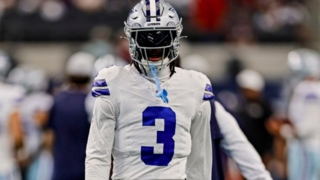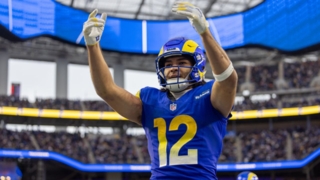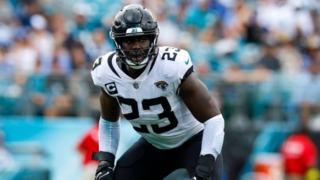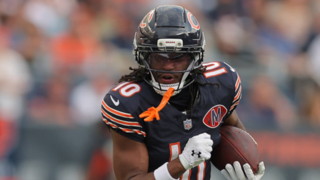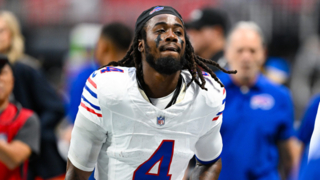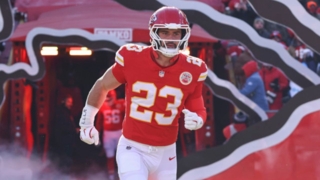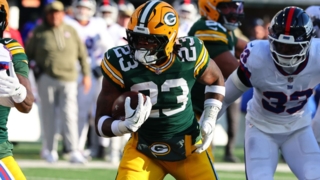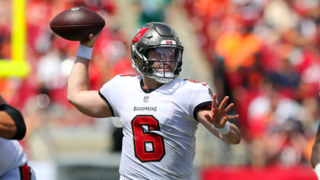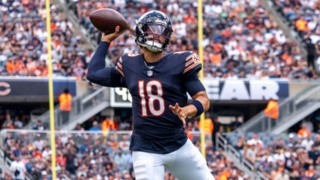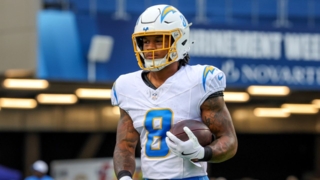Why I'm Not Using Zero RB Strategy ... And You Shouldn't Either

I’ve always been anti-Zero-RB ... And I’ve been wrong
I started playing fantasy football in 1997, an era in which RBs dominated the game. Check out these yards-from-scrimmage stats:
Barry Sanders: 2,053 yards in 1997
Terrell Davis: 2,000 yards in 1998
Marshall Faulk: 2,429 total yards in 1999.
So as I was learning how to play (and win) fantasy football, RBs were the key to winning championships.
Then the NFL changed. More passing. More specialized roles for RBs. Fewer workhorses like Sanders, Davis, and Faulk. And with that change in the role of NFL RBs came an evolution in assessing fantasy values.
A changing NFL means changing fantasy values
But changing fantasy mindsets isn’t easy — or at least it wasn’t for me.
While Rotoviz’s Shawn Siegle was penning the brilliant Zero RB, Antifragility, and the Myth of Value-Based Drafting back in 2013, I was still stuck in the ‘90s. Still loading up on RBs early.
And that was wrong. Early-round WRs won fantasy championships in the next few seasons after Siegle's article, while many of the allegedly elite RBs busted hard.
Being anti-Zero-RB was wrong.
Was.
So why am I anti-Zero RB strategy again in 2024?
The idea behind Zero-RB Strategy is to capitalize on the volatility and fragility of the RB position. You let your opponents take those early-round RBs that are riskier in comparison to the high-end WRs you’re gobbling up.
I’ll let Siegle take it from here:
“You can see fairly easily how Zero RB benefits from randomness. Whenever a starting RB gets hurt, my lineup gets better. It gets better in relation to my opponents because I didn’t have the player in question, and it gets better in the sense that I either own the backup or I have a shot to acquire the backup in free agency.”
That makes a ton of sense:
RBs get hurt more often than any other fantasy-relevant position. And backup RBs are often capable of stepping in and providing nice production.
But Zero-RB also relies on your ability to load up at WR and gain a big advantage over your competition at that position.
And that’s where the Zero-RB strategy will fail in 2024…
Zero-RB Strategy is no longer contrarian
Zero-RB was so successful for one principle reason: It was so contrarian... Was.
The folks who went full-on Zero-RB were able to assemble a dominant group of WRs.
Take 2013 as an example:
Just 17 WRs were selected in the first four rounds of drafts, according to My Fantasy League ADP data.
That means, theoretically, you could land four top-17 WRs. Do that and you’re gonna be tough to beat — even with minimal production at RB.
But ADP has changed.
However, the landscape has shifted significantly. ADP data shows a dramatic increase in WRs being drafted early (26 to 30 WRs in the first four rounds), making it much harder to assemble a dominant WR group using the Zero-RB strategy.
FFPC ADP has 26 WRs coming off the board in the first four rounds. While Underdog Fantasy ADP has a whopping 30 WRs inside the first 48 picks.
It's tougher now to draft a dominant group of WRs than it was in 2013.
The rise in popularity of the Zero-RB approach has – paradoxically – diminished its effectiveness, as the increased focus on drafting WRs early on has closed the opportunity gap that the strategy initially exploited.
How to Handle Zero-RB Strategy in 2024
"You want to be greedy when others are fearful. You want to be fearful when others are greedy.”
- Warren Buffett
With the rest of the fantasy community shifting more and more toward Zero-RB Strategy, you can capitalize by moving in the other direction.
Check out the number of RBs selected in the first one, two, and three rounds in 2013 vs. 2024:
| RBs in first round | RBs in first two rounds | rbs in first three rounds | |
| 2013 | 10 | 15 | 19 |
| 2024 | 4 | 8 | 9 |
Early-round RBs have plummeted in popularity in the first three rounds.
300+ touch RBs like Jonathan Taylor and Saquon Barkley would have been top-five picks 10 years ago. Now they're available deep in Round 2.
High-volume RBs like Travis Etienne and Derrick Henry aren’t even going in the first three rounds!
The smart play in 2024? Take advantage of that over-correction.
Viability of Zero-RB in 2024: Getting Value
Can Zero-RB work in 2024? It really depends.
Draft Dynamics: The Zero-RB strategy can excel in drafts where there's a higher demand for RBs, leaving top-tier WRs available for the taking.
Strategic Picks: Particularly for those selecting in the middle of the first round, the Zero-RB strategy opens up opportunities to secure a formidable WR core. You could find yourself with studs like Ja’Marr Chase, Drake London, and Jaylen Waddle – making your team competitive from the outset.
The Importance of Draft Flexibility
The point I want you to come away with is this:
Entering a draft with a rigid strategy, such as Zero-RB, might not always lead to the best outcomes. Looking for value – based on the draft's flow – is the most crucial strategy for assembling a playoff team.
Avoid Rigidity: Locking yourself into the Zero-RB strategy or any other predetermined approach can restrict your ability to capitalize on the draft's evolving dynamics. Being too focused on one strategy can lead to missed opportunities for value picks.
Best Player Available (BPA) Strategy: Instead, emphasize flexibility to grab the best player available at each draft spot, regardless of position. This approach means you're always adding the most value to your team – giving yourself the best chance to compete for a title.
Leverage Technology to Find Value in Each Round
If what you just read makes sense, I have a final thought for you:
Use a live-draft sync paired with a value algorithm to find the top value picks throughout your draft. Our unique version is The Draft War Room:
Real-live Assistance: By incorporating 17 different value indicators, the Draft War Room provides personalized recommendations for each pick – in real time. That means you're informed about the best value (regardless of position) based on how your draft plays out.
See How It Works: Want to discover all the ways The Draft War Room can guide you through Draft Day? Click here for a short video.
Frequently Asked Questions About Zero-RB Strategy
What is the Zero RB philosophy?
The Zero RB philosophy aims to take advantage of the volatility of the RB position by passing on RBs in the early rounds of fantasy drafts in favor of safer WRs, TEs, and QBs. When early-round RBs bust, you capitalize in two ways. First, you avoided that early-round bust. Second, you either own that RB’s backup or have a chance to add that backup off the waiver wire.
Does the Zero RB strategy work?
The Zero RB strategy can work depending on your league’s rules and the flow of your draft. The strategy works best in leagues with rules that favor WRs over RBs, and in drafts that skew toward RBs in the early rounds.
What is the Zero RB auction strategy?
Deploying a Zero-RB strategy in auction leagues means spending up on elite WRs – and potentially an elite QB or TE. You’ll spend just a small fraction of your auction budget on RBs, targeting cheap RBs that catch passes or are one injury away from big roles.
What is the Zero RB strategy in the Standard League?
The Zero RB strategy in a standard league is not as powerful as it is in a full-PPR or half-PPR league. That’s because elite RBs gain value in standard-scoring fantasy leagues.
What is the Hero RB strategy?
The hero RB strategy (also known as Anchor RB strategy) involves spending one early-round pick on an elite RB. You use the rest of your early picks on WRs, TEs, and QBs, filling out your RB depth with late-round picks and waiver pickups.
See how the Draft War Room optimizes your draft:
Draft using the best dynamic tool in the industry. Our fantasy player valuations (3D Values) change during your draft in response to...
- Exact league settings - direct sync
- Opponent and Team Needs
- Positional scarcity & available players
- Ceiling, injury risk, ADP, and more!
You need a dynamic cheat sheet that easily live-syncs with your draft board and adapts throughout your draft using 17 crucial indicators.
Get your Draft War Room Today
 Redraft
Redraft Dynasty
Dynasty Best Ball
Best Ball

